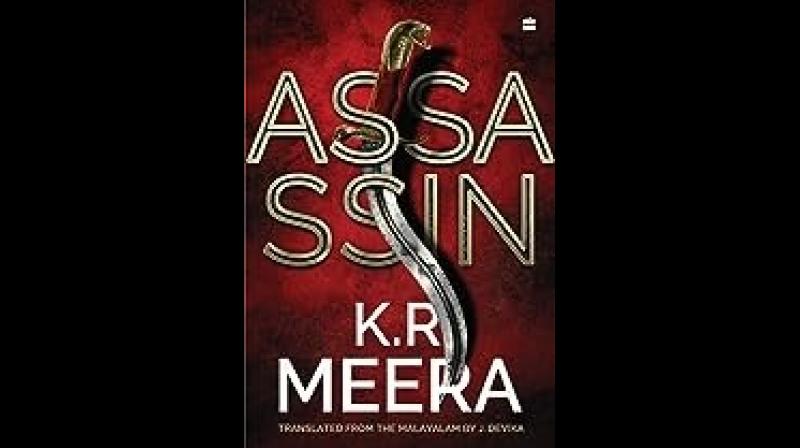Racy Tribute to Gauri Lankesh Has Heart in the Right Place

Dedicated to journalist and activist Gauri Lankesh who was murdered in 2017 by members of a right wing group, Assassin tells the story of strong, outspoken Satyapriya. She faces an assassination attempt outside her home in Bangalore a week after demonetisation when people are still dying in bank queues, waiting to get their money.
Fortunately, a neighbour arrives just after the second bullet misses her and the assassin flees. The general consensus is that it is a case of mistaken identity, because Satyapriya is just an ordinary middle-aged professional, not a powerful politically-connected or wealthy person. She thinks so too, till an anonymous phone call warns her that this had been yet another attempt on her life. Could the accidents she had had earlier not been accidents after all?
Now on a week’s leave visiting her home in Kerala, Satyapriya is horrified to learn from her bed-ridden father that the murder attempt was not a mistake. He warns her she may be killed any moment. Satyapriya asks who would want to do that to her, but just like in a bad movie, her father immediately chokes and dies.
Satyapriya’s mother tells her she should play detective to find out who wants her dead. The mother jokes that it would appropriate because when she was pregnant with Satyapriya, she had read very many detective stories. But so far, only one thing is clear to Satyapriya: The police had said that they suspected it was a “cut-out” assassination attempt, subcontracted many times over until someone actually did the killing, to conceal the identity of the person who ordered the murder.
Who ordered the hit on Satyapriya? Was it one of her former college boyfriends? Or her Kashmiri Maoist former lover? Could it have been the Swamiji at the ashram she used to work for? A former boss who had been in love with her? Or an enemy of her father?
Satyapriya does not trust the police at all, and is determined to hunt her assassin down herself so she can scornfully look him in the eye. She feels pity for this mercenary: “I did not like to see him as a contract killer. There was no beauty, no art, in it. He should kill me for himself—that’s what I liked. Only that felt thrilling.”
Her hunt takes her back to her past and reveals unpleasant truths about people she once liked or loved. Constantly in the backdrop is the “new” India that we currently live in. As Satyapriya points out, “This story was happening at a time in India during which it was pretty unsafe to open your mind to anyone. Especially for freedom-loving women like me.” She is not astonished when the police inspector assigned to the case tells her that while the hired assassin hated her father, he hated Satyapriya and her sister more because, “You two are too bold, haughty, not submissive to men.” Satyapriya’s strength shows in her retort: “By what sections of the Indian Penal Code are these crimes?” Patriarchy, the exploitation of women, and the scourge of the caste system run through the pages and make you squirm.
There are many light moments too, and satire rules. Satyapriya takes frequent potshots at demonetisation. When her mother asks her how long it will take for her investigation to end, Satyapriya cheekily mimics the PM: “Give me fifty days. If it doesn’t end by then, you can burn me.” Jokes aside, the state of the nation is revealed when Satyapriya’s neighbour in Bangalore, a college lecturer, has to cancel her series of lectures on demonetisation because the Vice Chancellor deems it anti-national to criticise the government. There’s a grim lesson of a lifetime in demonetisation for Satyapriya too: “The first step towards disarming the enemy is to make him poor.”
The Gandhi-Godse divide among family members rears its head in the new India, and it is faithfully and wittily depicted. Satyapriya’s young cousin Paramarth is a right wing loony who “sings songs of revenge and the thirst to drink the warm blood of foes”. Her mother says she tried to teach Paramarth a romantic song instead, and he wanted to know if the song writer was Hindu or Muslim. Satyapriya and her mother share giggles over his brainwashed, WhatsApp university state of mind. Take this dialogue between them:
‘“When he isn’t singing songs, he’s teaching me science.”
“For example?”
“For example, when you water the tulsi, it releases a flood of oxygen that energises the brain.”
“Says who?”
“Nasa.”
“But Nasa is a space research organisation!”
“If you tell him that, he’ll call you names.”’
Racy, pacy, witty, and lively, with strong female characters, Assassin is much more than a thrilling page-turner. It is the story of dangerous right wing-run India and a worthy tribute to Lankesh.
Assassin
By K.R. Meera
Translated by J. Devika
HarperCollins
pp. 654; Rs 699

